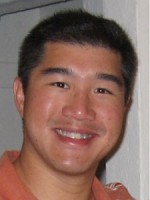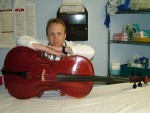Title
For some Juilliard graduates, there was an “aha” moment at which they decided to pursue another career. For others the movement away from the performing arts was more gradual. These alumni each had diverse reasons for pursuing health care and related sciences; all of them, however, felt that their art enhanced their subsequent professional lives.
Body
Pianist Samuel Chang (B.M. ’90) described his years at Juilliard as some of the best of his life. Yet rather than envisioning a career onstage, Chang saw himself working on Wall Street, and after graduating, to the consternation of his teachers, he started working as a derivatives floor trader. But Chang discovered that Wall Street wasn’t his calling either. Instead, he enrolled in medical school and went on to complete a fellowship in pulmonary/critical care at Cedars-Sinai Medical Center in Los Angeles, where he discovered sleep medicine. Now the medical and sleep medicine director at Delta Waves Sleep Disorders and Research Center in Colorado Springs, Colo., Chang compares his work to the arts, pointing out that in sleep medicine, “one simply can make another person feelbetter, which not all fields of medicine can.” Despite his professional path, Chang characterized his Juilliard education as very practical. “Because performance is all about communication,” he said, “a Juilliard grad learns to communicate well, to find that gentle balance between what one wants to say and what one wants the audience to hear.” And, he added, clinical medicine is “all about communication.”
Cardiologist James Bower (’86, violin) came to a crossroads at age 19, admitting to himself that a career as a concert artist was likely not in his future, and that even if it were, it was not what he wanted. With an uncle and cousin who were physicians as well as role models, “it was always music or medicine,” Bower said. He had a bit of a rude awakening when he started taking pre-med courses, recalling, “the memorization helped with studies but I had a very difficult time initially as I had no idea how to really study.” But he also said that his Juilliard experience afforded him a level of maturity lacking in his non-musical peers, “and that did help tremendously not just with medicine but with life.”
Eric Roter (’82, cello) remains active as a musician while working his day job as an emergency physician. Like many alumni working outside of the arts, Roter’s change of course was influenced by both practical and personal factors. “Shortly after I received my bachelor’s degree,” he said, “I thought very hard about what a career in music meant and how supply, demand, and economics were not in a musician’s favor. It didn’t matter how well one played or if one was a top prizewinner. I decided to pursue a career in medicine with the hope that someday I would return and give back, in some fashion, to music.” Last year he recorded the Bach Cello Suites on video for use as a fund-raising tool for 26 national health care charities on bachtohealth.org. Medicine, in turn, has enriched his music. “I have delivered babies and have been with people as they died and everything in between,” he said. “I like to think that in some way these experiences incorporate themselves into my artistry as a cellist.”
As a piano student at Juilliard, Helen Rosen (B.M. ’70, M.S. ’71) recalled, “I always had an intellectual side that wasn’t completely satisfied by my music, and I also had an intense desire to understand myself and others more deeply.” By the time she graduated, having grappled with stage fright and the death of her sister, she decided to change her focus. “I didn’t have a moment of revelation so much as I came to realize that I needed to pay attention to other needs that I had at the time,” she said. Rosen earned a degree in social work at N.Y.U. and a Ph.D. from Rutgers, eventually becoming certified as a psychoanalyst. But music still influences her work. “The ability to listen, pay attention and hear the ‘themes’ are skills I developed as a pianist that have been incredibly useful to me as a psychoanalyst and psychotherapist,” she said. “It is hard for me to imagine that my life today would have been anywhere near as satisfying without that part of my past.”
After getting her diploma from Juilliard in 1956, dancer Phyllis Murphy Stevenson joined the Merry-Go-Rounders, a well-regarded dance company that gave performances for children from the 1950s until the early ’70s. But Stevenson had always been interested in medicine as well as dance, and in 1960 she became a registered nurse. Craving more of a challenge, she went on to study anesthesiology, working as a certified registered nurse anesthetist in for 23 years at Montefiore Medical Center in New York City before retiring. Meanwhile, she continued to teach dance during the summer and also began working with senior citizens, choreographing for a group called the 60-Plus Swingers. “They are still performing, and I may get back to creating for them,” she said.
Several years after graduating from Juilliard, Jack Heller (Diploma ’52, violin) had an epiphany. “Even though I was concertmaster of [the Toledo Symphony Orchestra], performing in a string quartet, and teaching violin, I decided that I did not want to do that for the rest of my career,” he said. Instead, he decided to go into academia, spending 50 years on the faculty (he’s now a professor emeritus) at the University of South Florida’s School of Music, where he researches the ways in which people develop musicality. He has also regularly worked as a conductor, although he plans to retire as music director of the Tampa Bay Symphony this spring and focus on his work in language and music cognition. For Heller, the pursuits of music and science are inextricably linked. “A better understanding of how our music develops (in the brain) has informed my music-making,” he said. “The two areas constantly overlap.”
One day in 2003, Lisa Spector (B.M. ’83, piano) brought her puppy, a guide-dog-in-training, to a seminar about the way sound influences the human nervous system. Inspired, she wondered about the possible benefits of music therapy for dogs, and with the help of veterinary neurologist Susan Wagner, learned that by slowing down, simplifying, and in some cases lowering the pitch of classical music, her playing could lower anxiety levels in dogs. The end result was Through a Dog’s Ear, a series of recordings for dogs released by Sounds True and BioAcoustic Research and Development. In addition to selling the recordings, Spector also donates them to animal shelters, where the music calms the canine residents and is sent home with them when they are adopted. “I couldn’t have done that if I had chosen a traditional concert career,” said Spector, who has also recorded therapeutic music for people. She has noticed a difference in her own musicality as well. “My interest in playing music for therapeutic purposes has inspired me to slow down and hear works of great composers at a deeper level than before,” she said.
—Cory Robertson, Juilliard Journal Editorial Assistant







